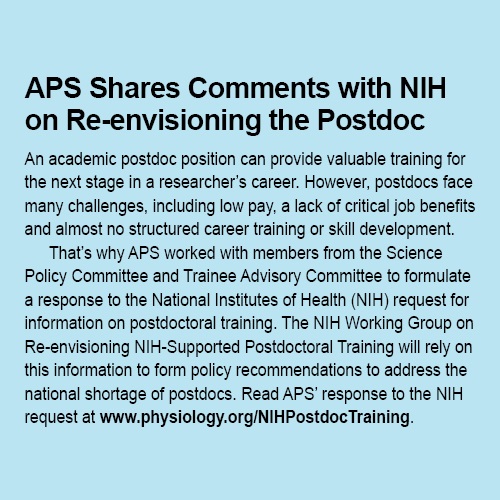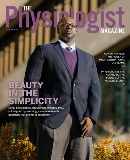Policy IQ
Learning to Embrace the Postdoc Exodus
By D. Ryan King, PhD
 It is true that postdocs are leaving academia. And no, they’re likely not coming back. But understanding why postdocs choose to exit academia is more complex than pointing out that the salary is bad.
It is true that postdocs are leaving academia. And no, they’re likely not coming back. But understanding why postdocs choose to exit academia is more complex than pointing out that the salary is bad.
I fell in love with cardiology as an undergraduate research assistant at the University of North Carolina-Chapel Hill. I was particularly fascinated by atrial fibrillation—a cardiac arrhythmia that affects 1 in 4 people in the U.S. during their lifetime. A significant impediment to “curing” atrial fibrillation is that we have no clear understanding of what causes it.
I began my PhD with Steven Poelzing, PhD, at Virginia Tech by investigating the etiology of arrhythmias. I loved my PhD. For me, it was a time of unfettered scientific exploration. I was encouraged to pursue my own interests and provided both the resources and guidance to help turn big ideas into reality. I was expected to compete for grants and publish papers, but I had support from my mentor regardless of whether the grants were funded or the papers were accepted.
Following my graduate work, I chose to become a postdoc because I had a notebook full of unanswered questions and a mindset to figure them out. It was not an easy decision—I had daycare bills in excess of $1,000 a month for my daughter and more than $70,000 in student loans, in the midst of the COVID-19 pandemic.
Many of my colleagues opted out of the academic path immediately. According to the National Science Foundation’s Survey of Earned Doctorates, the varied career paths sought by my colleagues are the norm, not the exception. Ultimately, I was one of the few from my PhD cohort that chose to stay, at least temporarily, in academia.
Recent PhD graduates are more often choosing to pursue careers in industry, government and nonprofit sectors.
Shortly after beginning my postdoc, I welcomed my second child into the world, adding to the financial burden. (Son Everett is with King on the left.) I was incredibly fortunate to receive student loan assistance through the National Institutes of Health (NIH) Loan Repayment Programs, which made the finances of remaining a postdoc feasible.
Now in year three of my postdoc, following two years of extreme inflation, the finances are increasingly uncomfortable as NIH salary minimums haven’t increased with inflation. Moreover, despite reports of a “postdoc crisis,” there are still far too few tenure-track faculty positions available, leading to postdocs being “stuck” within their current positions. The salary is bad, but equally important, the job prospects are dismal.
The postdoc crisis is generally framed in a negative light, as a problem that needs to be solved. But when speaking to PhDs employed outside academia, I find they are quite satisfied with their choice. So why is there such an emphasis on recruiting more graduates into the academic fold? An oversimplified answer is that postdocs play a vital role in academic research. If the postdocs disappear, so too does an important sector of the labor force.
There are several problems with postdoctoral training that could be addressed: insufficient salaries to meet the cost of living in cities where academic institutions are located; meager and inconsistent benefits such as retirement savings and disability leave; lack of a defined timeline for being “finished”; no employment agreement beyond one-year contract periods; and, at the end, no guarantee of a job in academia.
These are all points the APS Science Policy Committee raised in response to NIH’s request for information on Re-envisioning U.S. Postdoctoral Research Training and Career Progression within the Biomedical Research Enterprise (NOT-OD-23-084). For those who continue to pursue a postdoc, we must address these issues. But opting out of a postdoc is not inherently bad, and we should begin the conversation about what comes next for the academic workforce.
 There are other solutions that would alleviate the stress on postdocs. First and foremost is to raise the salaries of students and postdocs. Beyond that, there is a need to create more permanent staff scientist positions. These positions would create
a non-transient workforce and likely improve laboratory efficiency. For those who do choose to do a postdoc, promotion to independence should be built into the training. While it is not feasible to give everyone who completes a five-year postdoc their
own laboratory, there should be better defined pathways to independence.
There are other solutions that would alleviate the stress on postdocs. First and foremost is to raise the salaries of students and postdocs. Beyond that, there is a need to create more permanent staff scientist positions. These positions would create
a non-transient workforce and likely improve laboratory efficiency. For those who do choose to do a postdoc, promotion to independence should be built into the training. While it is not feasible to give everyone who completes a five-year postdoc their
own laboratory, there should be better defined pathways to independence.
The life of a postdoc is not one of glamour. Pursuing a postdoc often means living on credit. The constant pressure to publish or perish is exhausting for both postdocs and principal investigators—and it should come as no surprise that both are leaving academia in droves. Even if a postdoc chooses to tolerate the low salary, long hours and pressure to publish, there is still only an outside hope of landing a tenure-track position.
It is time to destigmatize walking away from academia. There are many fulfilling career paths outside the university system, and we must support our colleagues who choose to walk a different path.
D. Ryan King, PhD, is a third-year postdoc studying the physiological links between infantile epilepsy and early-life cardiac arrest. He currently serves as the trainee member of the APS Science Policy Committee.
This article was originally published in the July 2023 issue of The Physiologist Magazine.
The Physiologist Magazine
Read the Latest Issue
Don’t miss out on the latest topics in science and research.
View the Issue Archive
Catch up on all the issues of The Physiologist Magazine.
Contact Us
For questions, comments or to share your story ideas, email us or call 301.634.7314.


